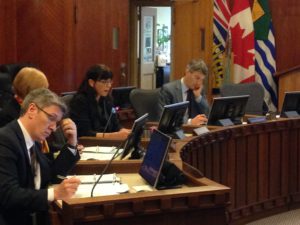Oil spills, like other disasters such as floods or fires, are inherently local. Boaters, beachgoers or local emergency services are often among the first to discover a spill; and it is communities that are left with the consequences long after the response teams have gone home. But when it comes to marine oil spill planning and response in Canada, those who are most directly affected and have the most to lose – coastal residents and the local governments representing them – have ended up on the sidelines.
Oil spill planning and response should involve all levels of government, including municipalities and First Nations. It should be a transparent process that is ultimately accountable to local communities. But right now, the federal and provincial governments and industry are not adequately engaging with or supporting the involvement of local governments. In turn, some local governments, lacking capacity and understanding marine oil spills to be entirely a federal responsibility, are not adequately planning to manage the consequences of a marine spill on their community. Meanwhile, citizens are neglected altogether, with no official voice in planning or oversight, and with limited opportunities to play a part in protecting the places they love if a spill were to happen in their community. And industry has been granted far too much power in our polluter-pay system.
We know that all the preparation in the world won’t necessarily prevent devastating impacts in the event of a major oil spill, and we know that the best way to guard against a spill is to prevent further increases in tanker traffic. But the reality is that we already have 60 oil tankers (and thousands of other ships carrying large quantities of fuel oil) travelling through our waters each year.
We are working to improve transparency and accountability in spill planning and response, put the brakes on industry-led planning, and make sure that communities have a voice at all stages of the process – so we are all in the best possible position to protect citizens and the environment if the worst should happen.
Campaign timeline
- October 2014. We ask candidates running in the 2014 local elections their views on municipal involvement in oil spill response, and what they would do to improve local capacity.
- May 2015. GSA releases a comprehensive report assessing local governments’ marine oil spill preparedness capability. The report reveals that many local governments are not able to adequately plan ahead to manage the consequences of a marine spill affecting their community, in large part because senior oil spill response partners are failing to provide the resources, information and engagement needed for local governments to effectively play their part in preparing and responding to a spill.
- June 2015. In response to the challenges exposed by the Marathassa spill in English Bay, we co-host a workshop led by world-renowned oil spill expert and author Dr. Riki Ott. The workshop focused on gaps in official response planning, and what the community can do to get better oil spill plans in place. Read the report from the workshop here.
- August 2015. We release a short report calling on all three levels of government to work together to bring about greater community involvement in oil spill planning and response.
- September 2015. Victory! In a province-wide vote at the Union of BC Municipalities convention, following a year of advocacy by GSA with municipalities and regional associations, BC’s local leaders unanimously endorsed a motion calling for additional resources and capacity-building for local governments to strengthen their oil spill preparedness.
- April 2014. We publish Oil Spills in Your Backyard: What BC’s coastal communities need to know – an easy to read guide for people who want to get the facts about how an oil spill could affect their health, their community, the local environment and BC’s economy.
- Spring 2016. The provincial government introduces legislation to strengthen land-based spill response, but the framework is deeply flawed (see our briefing document for more). Over 200 GSA supporters submit comments on the proposed framework, which make up the vast majority of the public comments received.
- Summer 2016. The federal government launches an Area Response Planning process designed to tailor spill response planning to specific regions, but it is plagued by familiar problems surrounding accountability, transparency and industry control. We commissioned world-renowned oil spill experts Nuka Research to prepare a best-practices guide for the federal government.
- November 2017. The federal Oceans Protection Plan is introduced, which commits to involving Indigenous and coastal communities in spill planning and response in an active and meaningful way.
- Winter 2016. Municipalities, First Nations and GSA sit down to develop a formal proposal for a Regional Community Advisory Council – a streamlined way for communities to have seat at the table in oil spill planning and response.
- Spring 2017. In a letter sent to GSA during their ultimately successful provincial election campaign, the BC NDP promises to provide local governments and Indigenous communities with better training and equipment for spill response, as well as support in developing their own internal plans; the NDP also expresses interest in seeing a Regional Community Advisory Council formed.

